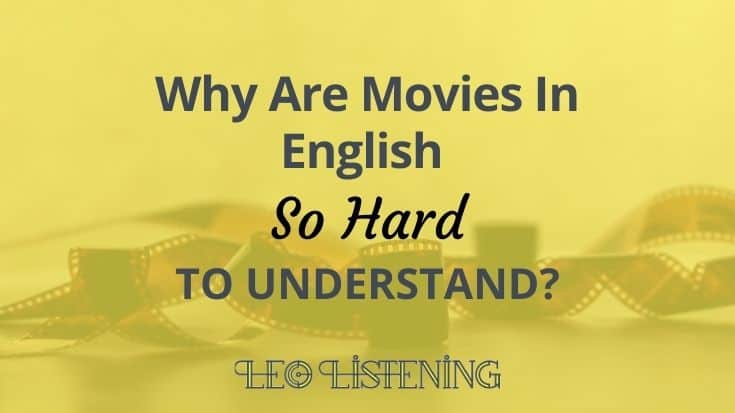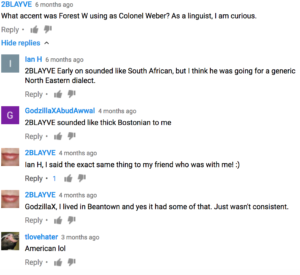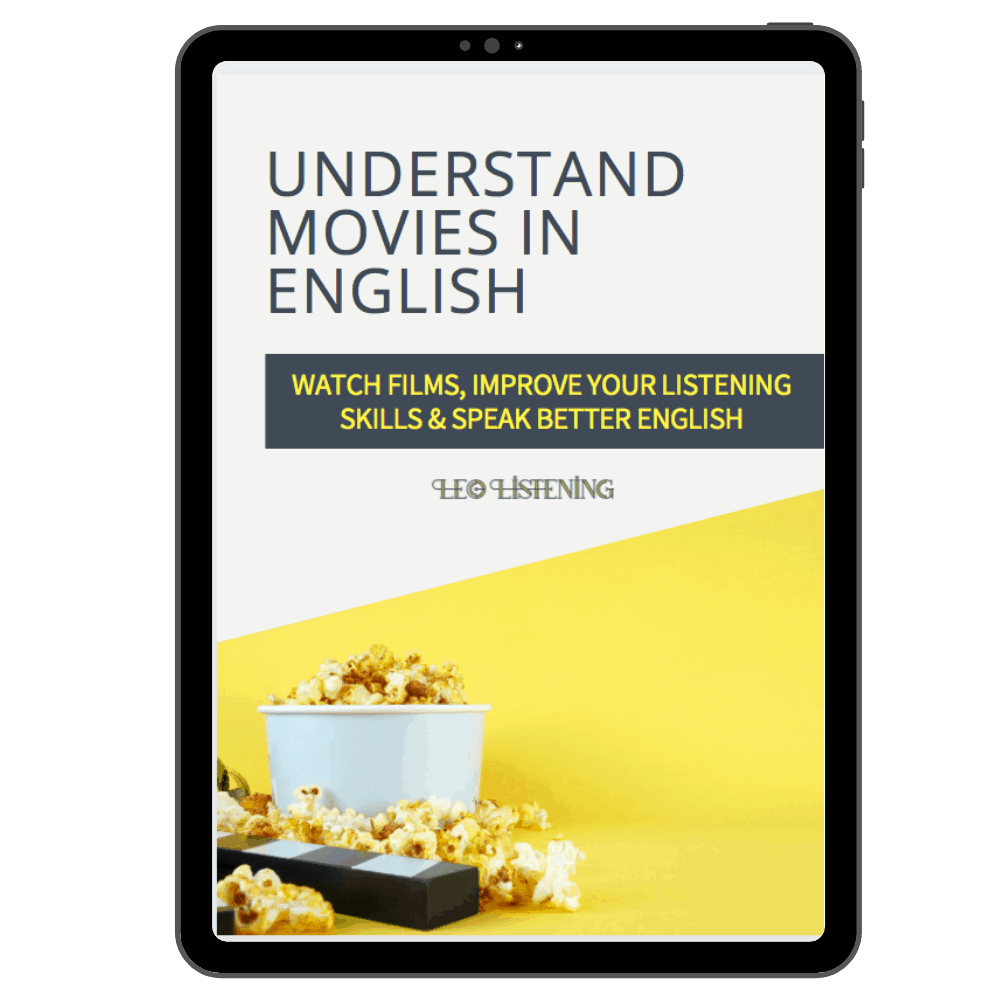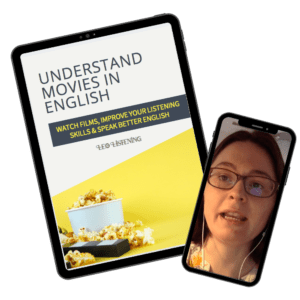Why Are Movies In English So Hard To Understand?

Updated October 2021
Have you seen the film Arrival?
It’s possibly the coolest, mainstream linguistics film ever.
In fact, I think it’s the only mainstream linguistics film ever.
It’s about a linguist, Dr Louise Banks, who’s sent to understand the language of alien invaders.
Sounds crazy, but it’s a beautiful and moving film about love, loss, courage, past, present and future.
Forest Whitaker plays Colonel Weber. He’s the army tough guy who brings in Louise as the translation genius to communicate with the aliens and find out their intentions.
Whenever he spoke, I had to make a huge effort to understand. My boyfriend kept asking me what he was saying – I had to admit that I wasn’t too sure! Listen to this:
But when I watched a clip of Forest talking about the movie as himself, I was alright. Try this clip:
By the way, a fun listening game you can play with this clip is guess the question. Based on Forest’s answers, can you write the questions? This is the kind of activity I do with my clients and we love it – lots of fun!
The discussion under this clip clarifies why I had a hard time understanding Forest as Colonel Weber.

So characters can have unfamiliar accents. I guess it’s all part of playing a role.
The Good Old Days Of Hollywood
My intuition was that back in classic Hollywood films (in the 1950s), the dialogue was more scripted and theatrical. Not improvised or at least not written to sound like real conversation.
I asked my cousin Mark about this (I’ve got 23 cousins, so probability suggests that one of them must know about this movie dialogue stuff). He’s a writer/director. Calm down: he hasn’t directed anything you’ve seen (but do check out his work here).
He told me that films started sounding naturalistic as far back as the 40s and 50s. Take On the Waterfront for instance:
Even the title screams natural, conversational English “I coulda been a contender”, not “I could have”.
But Mark also told me that the dialogue in Orson Welles’ The Magnificent Ambersons was theatrical. From a film expert point of view.
To me, that clip sounds just as natural as the first one. You’ll probably find both of them tricky to understand.
When I think of old Hollywood theatrical and non-natural dialogue, Charlton Heston’s, The Ten Commandments comes to mind.
That dialogue is pretty easy to catch right?
Maybe this is something to do with biblical epics or fantasy films. Take a look at this Lord of the Rings clip.

Ned Stark was in Lord of the Rings – who knew!?
The only thing that’s difficult to understand in these types of films are all the weird names of mythical creatures and places.
I once tried to read the Lord of the Rings on an 8-hour flight to Canada. I figured I could manage it in that time.
I opened the first page and every other word was “Hobbit”. I was like – what the hell is a hobbit? And then put the book down and watched the in-flight movie. Please don’t judge my 16-year old self. For the record, I haven’t seen the Lord of the Rings films either, as you can probably guess from my Ned Stark comment.
So If Movies In English Are Hard To Understand, What Can You Do?
- Start by forgiving yourself for not understanding. It’s not you, it’s them.
- Watch movie clips, not whole movies
- Use the subtitles as a learning tool. Subtitles can be your friend, if you let them.
- As a general rule (I’m sure you can think of plenty of exceptions) comedies, action films and fantasy epics are easier to understand than dramas.
- I’m working with a new student who told me “I’d like to understand at least 80% of what I listen to”. I was like: this guy gets it. 80% is a reasonable goal. I’m going into more detail soon about the Pareto principle or the 80/20 rule and how it applies to understanding spoken English.
- If you want to watch a whole film, take some advice from my Italian teaching buddy and fellow listening specialist, Elfin Waters and play the subtitles on, subtitles off game. Watch for 10 minutes with the subtitles, then for 10 minutes without them. You can vary the duration if you like.
- Before you start watching, Google the plot of the film or jump onto a site like IMDb for more information and context. You’ll have a bit more of an idea of what on earth is going on during those weird, initial 5-10 minutes.
- Give yourself time to get into a film, like you would with a book. One of my students lent me a copy of The Picture of Dorian Gray by Oscar Wilde. A wonderful, beautifully written book that’s tricky to understand, even for me as a native speaker.
She managed to finish it because she gave herself time to get used to that style. I get lost at the beginning of plenty of films and annoy my boyfriend by asking about the plot. You need time to get used to what’s happening and to adapt to the different voices you’re hearing.
That’s why I recommend watching films where the director casts the same actors. I’ve mentioned Wes Anderson’s films before, because I love them. And because in almost every film you’ll find Bill Murray, Jason Schwarzmann, one or both of the Wilson brothers etc.
Watch TV Series Instead
- Watch TV series, not films. Now, don’t get me wrong, TV series dialogue can be hard to catch too. But…
- Every week, you hear the same actors and the same voices. You’re not adapting each time.
- The context becomes more familiar to you as the weeks go by: the actors are in similar places, talking about similar things, using the words and expressions they always use.
Think about famous catch phrases you hear in series or things that happen week in week out:
-
- Uncle Phil throws Jazzy Jeff out of the house in the Fresh Prince of Bel-Air
- Kenny dies on South Park
- Someone dies on Game of Thrones and then comes back from the dead (maybe not in the same episode, but you know what I mean)
- Nothing in particular happens on Seinfeld
- The Gilmore Girls drink a lot of coffee (and eat loads of junk food yet never put on weight – what’s their secret?)
- You only have to concentrate for 20 minutes (sitcoms like Big Bang Theory, How I met Your mother, the Simpsons) or 45-50 absolute maximum if you’re a Game of Thrones or Breaking Bad fan.
Get Real
- Watch examples of natural, unscripted language too. Movie and TV series dialogue can prepare you for chatting to people in real life. But the best way to get used to that is by:
- Listening to my podcast
- Watching YouTube vloggers or Facebook live videos
- Listening to podcasts where people sit around chatting. You’ll find some suggestions here.
Beat The Movie Dialogue Blues
You dream of watching a movie without subtitles. But movie dialogue is tough to understand. Even for natives like me sometimes.
Your listening skills are not the problem here. What’s holding you back is:
- The unfamiliar context
- The trend towards naturalistic dialogue
- Actors you’ve never heard before
You have to give yourself permission (if you can’t, then I will), permission to
- Watch something that’s easier for you (a documentary, a cartoon, whatever makes you feel more confident because you know you can catch at least 80% of it, if not more)
- Watch movie clips
- Stick to TV series
- Watch with subtitles or play subtitles on, subtitles off
And if you do watch Arrival, don’t worry about Colonel Weber. Nobody understands him anyway.
Which clips did you find easiest or hardest to understand in this post? Let me know in the comments.
Subscribe To My Newsletter To Get Your Free Guide
Want to use your favourite movie or TV show to understand native English speakers when they talk fast? Download your free guide, Understand Movies in English.



Hi Cara,
so relieved to hear you confirm that we native speakers also sometimes have trouble understanding dialogue on films. As an EFL teacher I am very conscious of what I understand & thought it was only me having been away from the UK for too long even if it’s usually the American that causes me trouble. There are some actors on TV series who mumble so badly I wonder if they ever went to acting school & how they could have been chosen for the part!
I’m a great admirer of your work! Keep it up because, as I always tell my students, good listening leads to speaking naturally & correctly!
Hi Susan. Thanks for stopping by. Yes, you’re not the only one! We watch more American series at home, so my partner has a harder time with British accents (he’s French and we only speak French at home). But you’re right, some actors, no matter their accent do just seem to mumble! Maybe it’s to do with directors who’re going for a natural, conversational feel in their programmes/movies.
Anyway, glad you appreciate my work and do keep telling your students to focus on listening – it’s how we all learned our native languages after all.
Cara, this is gold. I love the way you wrote it <3 This perspective is refreshing, and the clips you've chosen for illustration provide plenty of exercise!
Thanks Elena! That’s so encouraging.
Hi Cara, thanks for mentioning me. 🙂
I had forgotten what a nightmare to listen to, Marlon Brando was!
The whole part about English speakers not understanding movies 100% is so hard to explain. My own boyfriend never believes me on that one!
So, I think it’s something you just have to keep coming back to.
Back in the early 90s, when I was living in London, there was a radio program where they spent a considerable amount of time on this song of REM. They asked the audience to figure out what was being said in the chorus and that was the funny part, nobody could guess! At the time, there was very little Internet, no lyrics online and Michael Stipe had this crazy way of enunciating.
I always use that as an example but it’s really hard to get beyond that preconceived idea that if you’re a native you have to understand everything. You’re not, your brain is simply filling in the blanks with your lexicon.
In other languages that happens too, but not as much as in English. And in foreign movies, actors tend to enunciate what they say a little more.
Hey, Elfin. No problem.
Yeah he is hard to understand!
Surely not understanding 100% is something everyone experiences in their native language? Maybe people just don’t like to admit it!
Song lyrics are the best example – some people spend years mispronouncing the song lyrics while signing in the shower. They give us great insights into connected speech and confused sounds.
I’m reading a book at the moment called “Thinking Fast and Slow”. There are some really fascinating insights into perception and how we’re influenced by so many factors. It’s not as simple as input – output. We don’t have an objective relationship with what we see and hear.
I have to admit that I do find dialogue in some French films hard to catch. It doesn’t happen so much in normal TV programmes. I think some French directors and actors are also going for the mumbly, method acting approach.
Maybe it´s because English is a stressed-timed language? Or maybe it´s more difficult for speakers of non-stressed-timed languages? When I was using misheard song lyrics to explain some of the features of connected speech, I had a look for some examples of misheard Spanish lyrics, but I didn´t really find much and my students didn´t really have any examples either.
Hi Lori. Thanks for commenting. Good point. I mean, most of the comprehension problems in English are to do with the rhythm or to do with connected speech. But I wanted to explore why I sometimes don’t understand films as a native speaker.
That particular issue goes beyond the usual difficulties to do with rhythm, stress and connected speech.
I love using misheard lyrics to explore comprehension problems – which ones did you use?
Hey Cara.
It’s interesting what you said about the goal of your student: Catching 80% of what he hears. It’s definitely more rewarding for us to set realistic goals. It’s happened to me that I fall prey to perfectionism and I want to understand 100% of what I watch, but then I feel discouraged because I can’t get everything I hear.
Perfectionism is a lie, and it blins us from our achievements, so lowering that percentage is a good suggestion, relieving, and encouraging. Great article!
Hey Diego. Yes, perfectionism sucks – you’re so right. Imagine understanding 80% which is such a fantastic achievement and then being disappointed because it’s not 100%! I’ve actually written more about the 80% goal here: https://leo-listening.com/80-20-rule-subtitle-freedom/